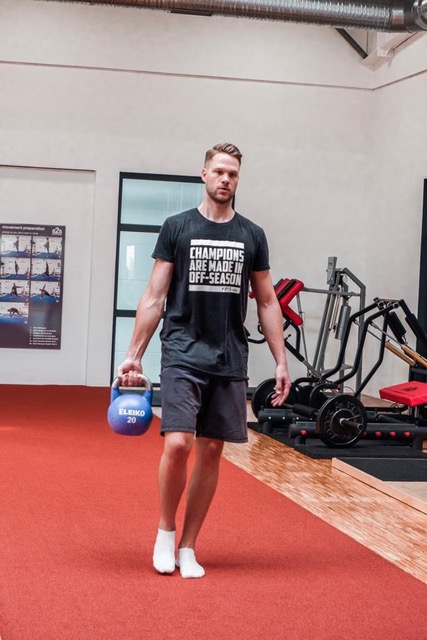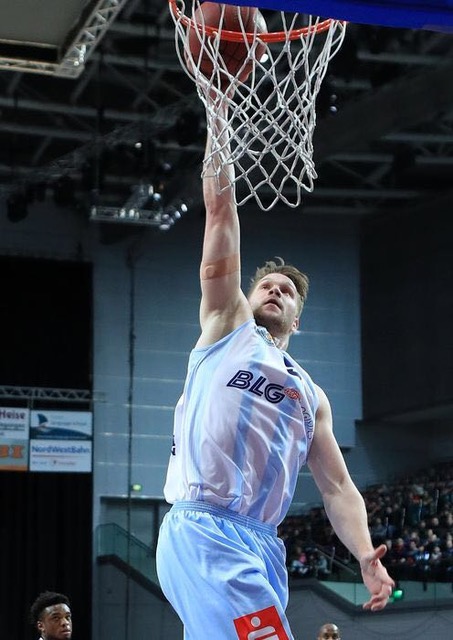T1D Pro Basketball Player Fabian Bleck Talks Support Systems + Consistency
Always the goal
One thing that has been consistent in Fabian Bleck’s life is his dedication to basketball. Currently a 26-year-old with type 1 diabetes and playing at basketball’s highest professional level in Germany, Bleck has been hooked on the game since he was 10 years old.
“My mother played back in the day and always took my two brothers and me to the games when we were little,” he recalls. “We played before her games, during halftime or after them.”
Bleck has two brothers, one who is two years older, and the other his identical twin. Together, the trio tried a myriad of other sports like soccer, badminton, swimming, table tennis, track and field. “But we all stuck to basketball,” Bleck says.
Unlike Fabian, neither of his brothers have type 1 diabetes.
 Bleck was diagnosed just before his 12th birthday. His mother and aunt recognized right away that he was experiencing many of the usual symptoms of a type 1 diabetes (T1D) diagnosis (extreme thirst, lack of concentration). “They kind of knew those symptoms from my grandfather,” Bleck says. “Because he also had type 1 diabetes, they made me check my blood glucose one day right after school at my aunt’s house.”
Bleck was diagnosed just before his 12th birthday. His mother and aunt recognized right away that he was experiencing many of the usual symptoms of a type 1 diabetes (T1D) diagnosis (extreme thirst, lack of concentration). “They kind of knew those symptoms from my grandfather,” Bleck says. “Because he also had type 1 diabetes, they made me check my blood glucose one day right after school at my aunt’s house.”
The glucometer read the dreaded “HI,” which none of them had ever seen before. Upon testing at the hospital, his reading was around 46.1 mmol/L830 mg/dL.
“I cried first, because I had no idea what it would mean for my life,” Bleck says. “My biggest concern in that moment was if I were able to continue playing basketball because it was and is still my passion.”
He remembers his week-long experience at the hospital as being a positive one—the doctors and nurses easing his mind in the midst of the arduous process of learning how to count carbs and give insulin. “One of the first things they told me is that I didn’t have to worry about quitting basketball,” Bleck says, “And that sport is absolutely good for diabetes treatment and I can do as much as I want to.”
Endless support
In the beginning, Bleck remembers his parents helping with food preparation and supporting him as he navigated his first month with T1D, but he feels grateful that they also allowed him to take on the responsibility himself.
“They knew that in school or during practice they couldn’t be there 24/7 so it helped me grow a lot,” he says. “Of course it changed my life in that moment, I always had to prick my fingers in the morning, before eating, before and during practice, before going the bed and the same with taking insulin. But after a while you get used to it and it’s like brushing your teeth.”
Bleck now wears an insulin pump (Medtronic Minimed 640g) and a continuous glucose monitor (CGM) (the FreeStyle Libre) and feels confident taking insulin in public, though in the beginning, he admits he would disappear to the bathroom to take his injections at school.
Bleck doesn’t view having type 1 diabetes in Germany as being drastically different from having it in the US, although he describes himself as having been lucky because he has always had coverage for his T1D supplies. Not unlike the US, some German insurance companies don’t cover certain supplies.

Making it work
Overall, Bleck does not feel that having T1D impairs him as a professional athlete. “Of course I have some days with bad numbers and I have to take a break during some practices,” he says. “But all in all, I am able to manage my diabetes good enough that I can give everything I have during practices and games to help my team.”
“I started playing basketball in the youth program of the First League team in my hometown, Hagen,” Bleck recalls. “After my last year with the junior team I started playing with the first league team, 1BBL or Basketball Bundesliga.”
Basketball Bundesliga is the highest level league of professional basketball in Germany. Bleck also played four seasons in Bremerhaven for the Eisbären Bremerhaven before joining the Crailsheim Merlins.
“The combination of T1D and sports has taught me a lot about what kind of food affects blood glucose,” he says. “What is good before a game or during a game with a low, and how sports affects my blood glucose postgame, and what I can do to regenerate. I also realized how different types of intensity levels during practices need to be handled—you have to adjust your management differently.”
Bleck says that nutrition, stress and excitement are three of the biggest elements of type 1 diabetes that he has learned to be conscious of going through life as an athlete.
“Over the years you get more and more experience and you kind of understand your body better. Even though you can’t always be right, you can always learn from it.”





